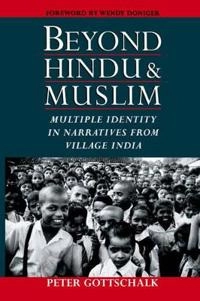This fieldwork-based study argues that the categories 'Hindu' and 'Muslim' are inadequate to represent the identities of actual individuals in India. At a time when the detonation of nuclear devices has heated the nationalist debates in Pakistan and India about the 'Hindu' and 'Muslim' nature of each other's politics, this discourse clearly poses a threat to the stability of the subcontinent. Yet not only have the mass mediain these countries and in the west been
quick to echo this communalist discourse, but most scholarship about South Asian religions and cultures relies heavily on 'Hindu' and 'Muslim' as descriptive adjectives and Analytic categories. Peter Gottschalk;s innovative study reveals a much more complex reality. During fourteen months of fieldwork
in the northern state of Bihar, Gottschalk collected narratives of the past from residents of several villages, both Hindu and Muslim. Analysing these narratives, he discovers that these villagers understand themselves to have not only a religious identity, but also gender, family, caste, and territorial identities which may complement or undermine any exclusively religious identity.
Åtkomstkoder och digitalt tilläggsmaterial garanteras inte med begagnade böcker





















